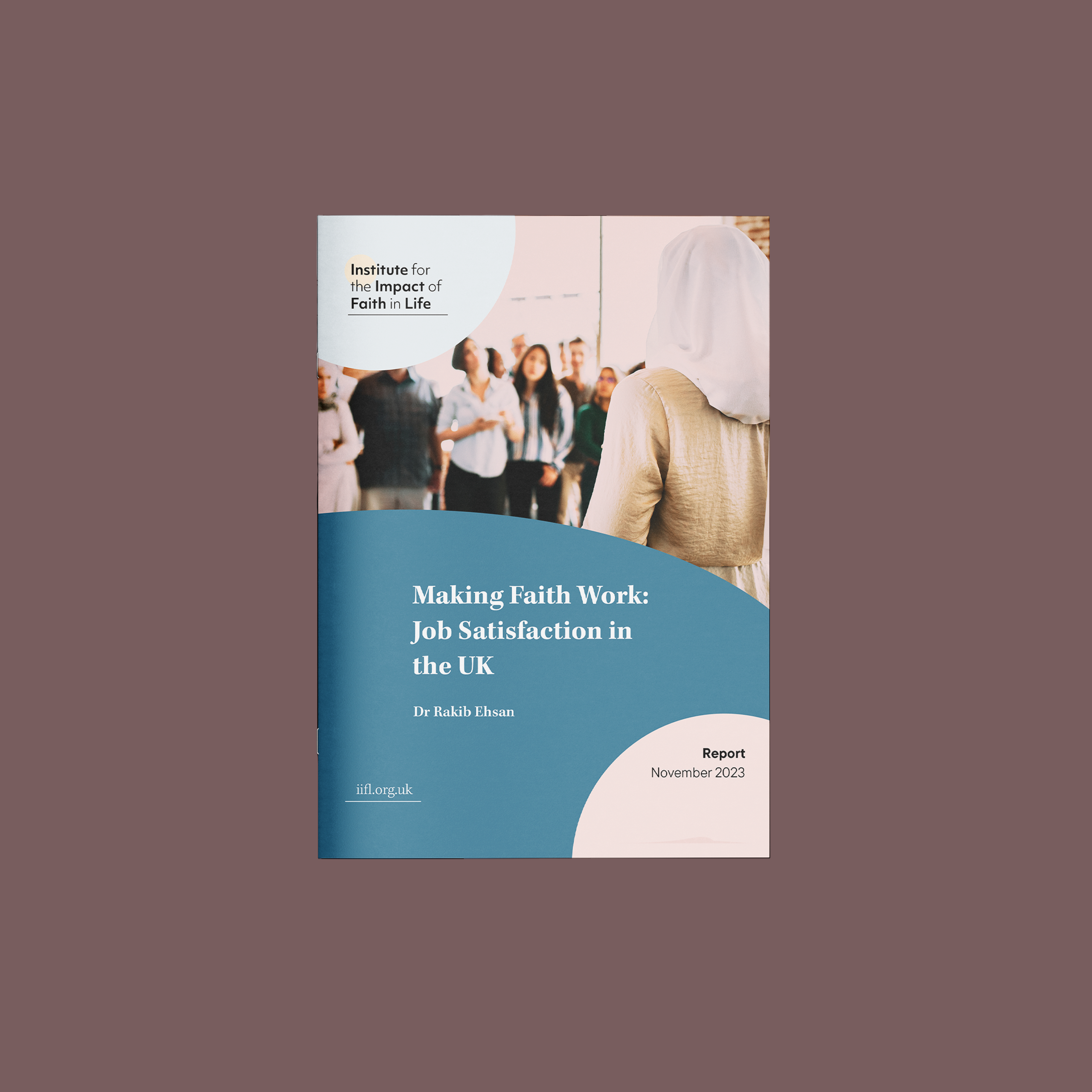Employers accommodating for religious beliefs and practices
- Among employed UK respondents who say that their religious background is important to their personal identity, around three in four (73%) feel positively about how their employer respects their religious beliefs and accommodates their religious practices. Only 3% feel negatively about their employer on this front, with 20% stating that they neither feel positively or negatively on this.
- Similarly, among employed UK respondents who say that they have a strong attachment to God/Gods/Higher Spiritual Being/s, around three in four (73%) feel positively about how their employer respects their religious beliefs and accommodates their religious practices. Only 2% feel negatively about their employer on this front, with 20% stating that they neither feel positively or negatively on this.
Trust in work colleagues and professional contacts
- Among employed and self-employed respondents who state that their religious background is important to their personal identity, more than three in four say they trust their work colleagues and professional contacts overall (77%), with 7% saying that they are distrusting of them.
- Among employed and self-employed respondents who state that their religious background is not important to their personal identity, 54% say they trust their work colleagues and professional contacts overall (with 23% saying that they are distrusting of them).
- Among employed and self-employed respondents who have a stated religious affiliation (Christian, Muslim, Hindu, Sikh, Buddhist or Jewish), nearly three in four say they are trusting of their work colleagues and professional contacts (74%), with 7% saying they were distrusting.
- Among employed and self-employed respondents who consider themselves to be atheists, less than half (49%) were trusting of their work colleagues and professional contacts overall. Nearly three in ten were distrusting of such people in their work-related life (29%).
- Among employed and self-employed respondents who say that they have a strong attachment to God/Gods/Higher Spiritual Being/s, over three in four say they are trusting of their work colleagues and professional contacts (76%), with 8% being distrusting of them overall.
- Among employed and self-employed respondents who say that they do not believe in God/Gods/Higher Spiritual Being/s, 50% say they are trusting of their work colleagues and professional contacts, with more than one in four (27%) being distrusting of them.
Religiosity and job satisfaction
- Among employed UK respondents who stated that their religious background is important to their personal identity, over three in four (77%) reported being satisfied with their job (with 9% being dissatisfied). For those who say their religious background is unimportant to their personal identity, the rate of job satisfaction is 56% – a drop of 21 percentage points. In this latter group, over one in five (22%) are dissatisfied with their job.
- Among employed UK respondents who have a stated religious affiliation (Christian, Muslim, Hindu, Sikh, Buddhist or Jewish), nearly three in four (73%) reported job satisfaction (with 9% being dissatisfied). Only half of atheist respondents reported job satisfaction (50%), with over a quarter stating that they are dissatisfied with their job (27%).
- For employed UK respondents who say that they have a strong attachment to God/Gods/Higher Spiritual Being/s, over three in four report job satisfaction (77%), with one in ten saying they are dissatisfied (10%). Among respondents who do not believe in divine or spiritual power/s, 52% report being satisfied with their job – with a quarter reporting job dissatisfaction (25%).
Religiosity and responsibility/duty
- Among UK respondents who say that their religious background is important to their personal identity, 87% say it is important to carry out everyday responsibilities and duties in a thorough manner (with 4% saying it is unimportant). Among those who say their religious background is unimportant to their personal identity, 73% say it is important to carry out everyday responsibilities and duties in a thorough manner (with 12% saying it is unimportant).
- Among UK respondents who say that they have a strong attachment to God/Gods/Higher Spiritual Being/s, 89% say that it is important to carry out everyday responsibilities and duties in a thorough manner (with 4% saying that it is unimportant). Among those who do not believe in the existence of a divine power or spiritual being (or beings), 70% say it is important to carry out everyday responsibilities and duties in a thorough manner (with 14% saying it is unimportant).
- Among UK respondents who state a clear religious affiliation (Christian, Muslim, Hindu, Sikh, Buddhist or Jewish), 86% say it is important to carry out everyday responsibilities and duties in a thorough manner (with 4% saying it is unimportant). Among atheist respondents, 69% say it is important to carry out everyday responsibilities and duties in a thorough manner (with 16% saying it is unimportant).
Religiosity and optimism over the future of the UK economy
- Among UK respondents who stated that their religious background is important to their personal identity, 35% believe that the UK economy’s best days lie ahead. This drops to 17% for those who say that their religious background is unimportant to their personal identity. In the former group, 35% categorically do not believe that the UK economy’s best days lie ahead – rising to 57% for the latter group.
- Among UK respondents who say that they have a strong attachment to God/Gods/Higher Spiritual Being/s, 34% believe that the UK economy’s best days lie ahead. This falls to 16% among those who do not believe in the existence of divine and spiritual power/s. In the former group, 35% categorically do not believe that the UK economy’s best days lie ahead – rising to 60% for the latter group.
- Among UK respondents who stated a clear religious affiliation (Christian, Muslim, Hindu, Sikh, Buddhist or Jewish), 31% believe that the UK economy’s best days lie ahead. This drops to 16% among atheist respondents. In the former group, 36% categorically do not believe that the UK economy’s best days lie ahead – rising to 59% for atheist respondents.


